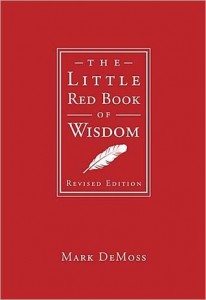Imagine a public relations firm whose philosophy is “tell the truth at all costs”. Not possible? Not for Mark Demoss, founder of PR firm the Demoss Group. He created exactly that.
 His book The Little Red Book of Wisdom contains boulders of practical guidance packaged in interesting, nugget-sized chapters. Half of the book specifically addresses the business world and the second half covers personal matters a refreshing change from the typical success-manual mode.
His book The Little Red Book of Wisdom contains boulders of practical guidance packaged in interesting, nugget-sized chapters. Half of the book specifically addresses the business world and the second half covers personal matters a refreshing change from the typical success-manual mode.
Like The Demoss Group itself, The Little Red Book of Wisdom is atypical on every level: unapologetic-ally Christian, Demoss manages to frame his philosophies biblically without preaching or moralizing. Instead, he illustrates his points with personal experiences and current events in a conversational style that’s easy reading for harried executives.
But this isn’t a sappy read: with chapters like “Do Something So Difficult, You’ll Never Want to Do It Again”, and “The Best Defense is a Good Defense”, Demoss challenges readers with time-tested philosophies that he personally practices. Not one concept is overwritten: if Demoss can cover it in a couple of sentences, he does.
The Little Red Book of Wisdom deserves a place on every leader’s desk, for short bursts of inspiration on the long road of service.
Meredith Healey is a single mom, so she needs all the self-improvement she can get. She blogs about her progress at http://sinthesinglemom.blogspot.com/



